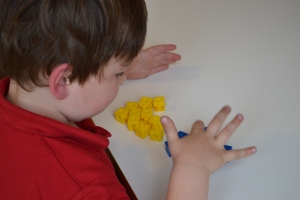The information on this page provides an introduction to the cognitive skills that are involved in learning maths. It offers a useful resource for primary and secondary school teachers to give them an overview of research in this area. Possible reasons for children’s difficulties with maths are identified and some useful tips for exploring these difficulties are provided. A pdf version can be downloaded here.
What does maths involve?
There are lots of different areas of maths, including arithmetic, geometry and algebra. For each of these areas, children need to learn the relevant facts, know how to apply appropriate procedures, and understand the concepts involved. For example, in arithmetic, children need to learn their number bonds and times tables, know how to add, subtract, multiply and divide, and also understand the relationships between these different operations (e.g. that addition is the opposite of subtraction). Children can vary in how good they are at these different skills, for example some children might have excellent procedural skills but struggle with understanding concepts. Other children might have good conceptual understanding, despite poor procedural skills.
Which cognitive skills are needed for maths?
How are these skills involved in maths?
Are these skills all equally important for maths? The answer to this depends on whether you’re looking at children’s memory for maths facts, procedural skill or conceptual understanding. Different combinations of skills are more or less important for these different components of maths. For example, the set of skills known as executive functions (holding and manipulating information in mind (working memory), ignoring distractions and flexible thinking) are more important for learning maths facts and procedures than they are for conceptual understanding. For more information about the role of executive functions in early years mathematics, read this TES article (subscription only).
How is this relevant in the classroom? The maths you use everyday in the classroom will tap into children’s factual, procedural and conceptual knowledge but also draw directly upon these other more general skills. For example, mathematical problem solving requires working memory and flexible thinking to identify the problem that needs to be solved. As you might expect, how well children are able to pay attention to the class teacher is also important.
Does age matter? Although children’s understanding of mathematics develops dramatically through primary and secondary school, they draw on the same set of underlying skills throughout.
Why do some children find maths difficult?
 One reason why so many children find maths difficult is that it draws on such a wide range of underlying skills. If a child has difficulties with any one of these
One reason why so many children find maths difficult is that it draws on such a wide range of underlying skills. If a child has difficulties with any one of these
skills it might impact on their maths achievement. For example, a child with poor working memory might struggle with multidigit sums that require them to hold interim solutions in mind. Alternatively, a child with poor conceptual understanding might have difficulties choosing an efficient strategy to solve a problem, e.g. knowing that some subtraction problems are more easily solved by addition than subtraction. Our research suggests that children who have similar levels of maths performance might have very different strengths and weaknesses.
What can I do about it?
Loughborough University Mathematics Education Network (LUMEN) has CPD videos about executive functions in mathematics, Working Memory and Inhibition (2023) but unfortunately there is no easy answer to this question! If a child is having difficulties with maths it makes sense to look at their strengths and weaknesses in learning maths facts, carrying out procedures and understanding concepts, rather than focusing on their overall performance. It might also be helpful to consider the underlying skills, such as how good they are at storing and manipulating information in mind, ignoring distractions and thinking flexibly.
There are some simple games you can do to investigate some of these underlying skills. See the useful resources below. More broadly, you might want to consider how the activities you use in the classroom might challenge children’s general thinking skills, such as the amount of information they have to hold in mind. Sometimes this might be a good thing, but at other times you might want to reduce these demands, by using concrete manipulatives such as hundred squares or number lines for example, so that children can focus on a new idea that they’re being introduced to.
Useful resources
www.bristol.ac.uk/expsych/public-engagement/working-memory/
http://calm.mrc-cbu.cam.ac.uk/
Mr Barton Maths podcast about executive functions and mathematics (2021)



